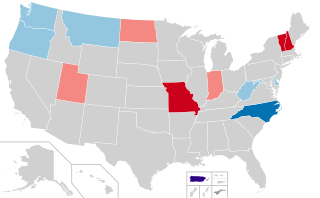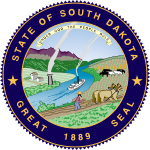
The governor of South Dakota is the head of government of South Dakota. The governor is elected to a four-year term in even years when there is no presidential election. The current governor is Kristi Noem, a member of the Republican Party who took office on January 5, 2019.

Richard Francis Kneip was an American diplomat and politician who served as the 25th governor of South Dakota from 1971 until 1978 and the 6th United States Ambassador to the Republic of Singapore. He was a member of the Democratic Party and the first Catholic Governor of South Dakota.

The 1974 United States Senate elections were held on November 5, with the 34 seats of Class 3 contested in regular elections. They occurred in the wake of the Watergate scandal, Richard M. Nixon's resignation from the presidency, and Gerald Ford's subsequent pardon of Nixon. Economic issues, specifically inflation and stagnation, were also a factor that contributed to Republican losses. As an immediate result of the November 1974 elections, Democrats made a net gain of three seats from the Republicans, as they defeated Republican incumbents in Colorado and Kentucky and picked up open seats in Florida and Vermont, while Republicans won the open seat in Nevada. Following the elections, at the beginning of the 94th U.S. Congress, the Democratic caucus controlled 60 seats, and the Republican caucus controlled 38 seats.

United States gubernatorial elections were held on November 7, 2000, in 11 states and two territories. The elections coincided with the presidential election. Democrats gained one seat by defeating an incumbent in West Virginia. As of 2024, this remains the last gubernatorial cycle in which a Democrat won in Indiana.
The following table indicates the party of elected officials in the U.S. state of South Dakota:

The 1994 Minnesota gubernatorial election took place on November 8, 1994, in the midst of that year's Republican Revolution. Incumbent Republican Arne Carlson easily won re-election over Democrat–Farmer–Labor state senator John Marty.

United States gubernatorial elections were held on November 8, 2016, in 12 states and two territories. The last regular gubernatorial elections for nine of the 12 states took place in 2012. The last gubernatorial elections for New Hampshire, Oregon, and Vermont took place in 2014, as Oregon held a special election due to the resignation of Governor John Kitzhaber, while the governors of New Hampshire and Vermont both serve two-year terms. The 2016 gubernatorial elections took place concurrently with several other federal, state, and local elections, including the presidential election, Senate, and House elections.

The 1994 South Dakota gubernatorial election took place on November 8, 1994 to elect a Governor of South Dakota. Republican former Governor Bill Janklow was elected, defeating Democratic nominee Jim Beddow.
Bernie P. Hunhoff is an American politician and a former Democratic member of the South Dakota Senate representing District 18 from 1993 to 1999 and 2015 to 2017. Hunhoff was also a member of the South Dakota House of Representatives for District 18 from 2009 to 2015. He served as the House minority leader during that time.

The 1990 South Dakota gubernatorial election took place on November 6, 1990, to elect a Governor of South Dakota. Republican Governor George S. Mickelson was re-elected, defeating Democratic nominee Bob L. Samuelson. As of 2024, this was the last time Oglala County and Todd County voted for a Republican gubernatorial candidate. Mickelson died in a plane crash near Zwingle, Iowa on April 19, 1993.

The 1986 South Dakota gubernatorial election was held on November 4, 1986 to elect the Governor of South Dakota. Incumbent Bill Janklow was term-limited, so the field for the new governor was open. Republican nominee George S. Mickelson was elected, defeating Democratic nominee Ralph Lars Herseth.

The 1982 South Dakota gubernatorial elections were held on November 2, 1982, to elect a Governor of South Dakota. Republican candidate Bill Janklow was elected, defeating Democratic nominee Mike O'Connor to take a second term in office.

The 1978 South Dakota gubernatorial election was held on November 7, 1978, to elect a Governor of South Dakota. Republican nominee Bill Janklow was elected, defeating Democratic nominee Roger D. McKellips.

The 1972 South Dakota gubernatorial election was held on November 7, 1972, to elect a Governor of South Dakota. It was the last election in South Dakota to elect the governor for a two-year term after a 1972 state constitutional amendment established a four-year term. Democratic nominee Richard F. Kneip was re-elected, defeating Republican nominee Carveth Thompson. Despite incumbent Republican President Richard Nixon winning The state with 62% of the vote on the same ballot.

The 1896 South Dakota gubernatorial election was held on November 3, 1896. Incumbent Republican Governor Charles H. Sheldon declined to run for re-election to a third term. Former Secretary of State Amund O. Ringsrud was nominated as Sheldon's replacement at the Republican convention. Ringrud's main opponent was businessman Andrew E. Lee, who was nominated by a makeshift coalition of Populists, Free Silver Republicans, and Democrats. In the general election, Lee narrowly defeated Ringsrud, the first defeat for the Republican Party in a gubernatorial election since statehood.

United States gubernatorial elections were held on November 8, 2022, in 36 states and three territories. As most governors serve four-year terms, the last regular gubernatorial elections for all but two of the seats took place in the 2018 U.S. gubernatorial elections. The gubernatorial elections took place concurrently with several other federal, state, and local elections, as part of the 2022 midterm elections.

The 1990 United States Senate election in South Dakota was held on November 6, 1990. Incumbent Republican U.S. Senator Larry Pressler ran for re-election to a third term, beating Democratic nominee Theodore 'Ted' Muenster by 19,000 votes. This was the last time until 2014 that a Republican would be elected to South Dakota's Class 2 Senate seat.

The 1936 North Dakota gubernatorial election was held on November 3, 1936. Nonpartisan League nominee William Langer defeated incumbent Republican Walter Welford with 35.80% of the vote.

The 1970 South Dakota gubernatorial election was held on November 3, 1970.

The 1914 South Dakota gubernatorial election was held on November 3, 1914. Despite a close election in 1912, incumbent Republican Governor Frank M. Byrne defeated Democratic nominee James W. McCarter, an Edmunds County Judge, with 50.07% of the vote. Coincidently, Bryne's Democratic opponent in 1912, Edwin S. Johnson, was elected the same year to represent South Dakota in the United States Senate.



















